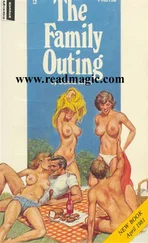“And the homework was what?” I ask Ellen. “To write a story?”
She eyes me suspiciously. “Why are you so interested? I’d hardly be writing a story if I’d been told to draw a pie-chart, would I?”
Hallelujah. “I withdraw the question.”
No reaction from Ellen.
Pull that in my courtroom again, I’ll have you disbarred, counselor.
How could I explain to anyone who didn’t know us that I’m worried about my daughter because she’s stopped pretending to be an irascible American judge? They’d think I was insane.
“Does the story have to begin with a family tree?” I ask.
“No. Mum, seriously, stop interrogating me.”
I think about saying, I’m not keen on family trees. In fact, I loathe them.
No, I’m not going to do that. It would be a bribe—“Chat to me like you used to and I’ll tell you a juicy story”—and it wouldn’t be fair.
Hardly juicy. A family tree on a child’s bedroom wall. With the wrong family on it.
Cut.
That’s one useful thing about having worked in television, at least: I have extensive experience of ruthless cutting. If I don’t like a scene that’s playing in my mind, I can make it disappear as quickly as an axed TV drama.
Usually.
“Where did you get those names from?” I ask Ellen. “Bascom and Sorrel Ingrey—”
“Mum! For God’s sake!”
“Garnet, Urban, Allisande . . . they’re so strange. And why did you use your own name? Why is there an Ellen in the Ingrey family?”
“I don’t know. There just is. Stop inventing things to worry about. It’s just a story.”
I can hardly tell her that reading it made me feel as if I’d swallowed a lead weight. “Yes, and you’ve decided to put things in your story for a reason.”
“I didn’t think about the names.” Ellen studies her fingernails, avoiding my eye. “I wanted to make the story sound old-fashioned and sinister, I suppose.”
“You succeeded,” I tell her. The heavy feeling in the pit of my stomach lifts a little. Maybe there’s nothing to worry about after all. “You should add dates. To the family tree—not necessarily to the story. What time period are you in? What year did Perrine Ingrey murder Malachy Dodd?”
“I don’t know!” Ellen snaps. “Some time in the past. And don’t talk about the characters as if they’re real. Ugh, it’s embarrassing.”
That’s her. She’s still in there.
“Look, it’s only some stupid homework,” she says, expressionless again. “It doesn’t matter to anyone. Twenty years ago, twenty-five. What do dates matter? It’s just a story. Why do you care?”
Am I deliberately trying to enrage her because any reaction would be better than blank withdrawal? She isn’t nearly angry enough. The old Ellen would never have tolerated this level of interference or said that any creative project of hers didn’t matter. By now I would have been having clothes thrown at me.
“I care, Ellen. Why did you put a murderer in your bedroom?”
“What?” For a fleeting moment, I see my own fear reflected in her eyes. Then it’s gone.
“Perrine Ingrey. Her bedroom in the story is this room.” I point to the little mint-green door by the side of Ellen’s bed. A quarter of the size of the shortest dwarf in the world.
“No reason,” says Ellen. “Literally, no reason. I needed a room, this is a room . . .” She shrugs.
“I wondered if maybe it’s going to turn out that Perrine didn’t kill Malachy Dodd after all. That someone else did.”
“No, because it says more than once that she did kill him. That part’s not in doubt. You can’t have read it very carefully.”
“I read it four times. I thought all the stuff about her killing him was protesting too much, and that—”
“ No, Mother. That would be a cheat. It’s in the third person. That wouldn’t be an unreliable narrator, it would be me, the author, lying. You can’t do that.”
I smile. “How do you know the unreliable narrator rules? Not from Mr. Goodrick?” This is a man who regularly cancels proper lessons in favor of impromptu circle-singing sessions. I chose Ellen’s school because of its unusual flexibility, then quickly realized that I didn’t want it to flex for anyone but me.
A miracle happens. Ellen smiles back. “What do you think? Mr. Fisher, the Nerd King, gave us a mini-lecture about narrative perspective, including unreliable narrators. It was so boring. His class is doing the story homework too. All Mr. Goodrick said was ‘Don’t use the word “said.”’ He wants us to use more interesting speech words. That’s why everyone in my story exclaims and yelps, in case you didn’t notice.”
“I didn’t. I think I’d yelp if I encountered an Ingrey. And there’s nothing wrong with ‘said,’ said your mother.”
Too late. Ellen has shut down again. We were starting to talk properly, like we used to, so she had to distance herself.
Mr. Fisher—which one is he? The Scottish hard-blinker with the huge glasses? His first name is something Celtic-sounding. Lorgan? Lechlade?
“Why did you choose a murder mystery story?” I ask Ellen. “And why do the Ingreys have to live in our house? I’m not sure I want to share it with the weirdest family in the whole of Kingswear, even if they are fictional.”
Ellen gives me an unfathomable look. “Are you thinking Perrine Ingrey’s going to get murdered in my bedroom? She isn’t. Don’t worry. She doesn’t get killed in the house or the grounds.”
“Then where?”
“I haven’t written it yet.”
“Still. It sounds as if you know.”
“I’m saying: you don’t have to worry about murders in your house.” Ellen rolls her eyes. “If you’re so addicted to drama, go back to work, for God’s sake.”
“I’m not addicted to—”
“Really? Then why are you always imagining things that sound like the beginnings of really crap TV movies?”
Happily, I feel no urge to point out that nothing I made was crap. You are dead to me, old life and former career. I’m proud of different things these days—proud that this morning I sat on the doorstep for nearly an hour, wrapped in a blanket, watching the boats on the river.
“Like that thing with the house on the North Circular—your weird premonition,” Ellen says. “I bet you never bothered to Google it, did you?”
“No. Why? Did you?”
She nods. “You were right, German isn’t its name. It’s Germander. You must have seen the outlines of the three missing letters. Germander. Do you get it now?”
“Germander Speedwell.” I know the right answer, but can’t immediately work out what conclusion I’m supposed to draw.
It’s a plant. I hadn’t heard of it until I looked up the name Speedwell, after our first tour with the real estate agent. Veronica chamaedrys : an herbaceous perennial plant with hairy stems and leaves. Blue four-lobed flowers. Otherwise known as Germander Speedwell.
“You saw a house called Germander and you connected it with Speedwell House because of the plant name,” says Ellen. “That’s why you had that weird feeling. That and Dad being an arse and saying, ‘Look, there’s our new house.’ It’s so obvious.”
“Don’t call Dad an arse,” I say distractedly.
Is this the resolution of a four-month-old mystery? Can I put up a big “Solved” sign in my head? It bothers me that I’m unable to answer the question definitively. I need to tell Alex, see what he thinks. Did I see the outline of the three missing letters? I don’t remember seeing them.
“How long have you known?” I ask Ellen.
Читать дальше











